Editorial and Partnership Disclosure Fit Small Business has partnered with CardRatings for our coverage of credit card products. Fit Small Business and CardRatings may receive a commission from card issuers. This is a recurring post with regularly updated card details. Opinions, reviews, analyses & recommendations are the author’s alone and have not been reviewed, endorsed, or approved by any of these entities.
Credit card stacking involves applying for multiple credit cards in a specific order to access a larger unsecured line of credit. It can be done on your own or through a credit card stacking company.
Key Takeaways
- Credit card stacking benefits startups and small business owners who may not qualify for small business loans or high-limit business credit cards.
- With proper execution, credit card stacking can serve as a valuable business funding strategy.
- It is best for startups, businesses that need quick funding, and business owners who have no collateral or access to financing.
- Credit card stacking costs include stacking lender fees, annual fees, and annual percentage rates (APRs).
How Credit Card Stacking Works
Credit card stacking works like an unsecured line of credit, where you use multiple credit cards to fund your business. The combined limits of your stack represent your unsecured line of credit, which is revolving and can be used repeatedly.
This is a viable alternative to loans, especially if you lack collateral. However, since it involves unsecured credit, it’s considered high risk, and issuers usually require a credit score of at least 680 to qualify.
A few things to note about how credit card stacking works:
- Revolving credit limit: Your purchases draw from an approved credit limit, which must be paid off monthly for reuse.
- Interest on unpaid balance: If balances aren’t fully paid, interest accrues until settled. Note that these may vary per cardholder.
- Personal guarantee required: Most unsecured business credit cards require a personal guarantee since credit card issuers want to mitigate their risk. This allows lenders to pursue personal assets if debts aren’t repaid. Consider our guide on the best credit cards that don’t require personal guarantees and include them on your stack.
- Timely payments: Paying your balance, including interest and charges, helps build business credit. Nonpayment can harm your credit score and financing options.
- No Collateral Needed: Unsecured credit cards do not require collateral from business or personal assets.
If you have the knowledge, time, and willingness to go through multiple credit card applications, then you can perform credit card stacking independently. If you lack experience and want to make the application process more efficient, consider hiring a credit card stacking company.
Pros & Cons of Credit Card Stacking
| PROS | CONS |
|---|---|
| No collateral requirement | Minimum 680 personal credit score requirement |
| Multiple 0% introductory periods offer | Higher ongoing interest rates than most small business loans |
| Quick approval and funding | Frequent monitoring of credit cards with different interest, balances, and due dates |
| Minimum impact on personal credit scores | Potential annual fees and other charges |
Cost of Credit Card Stacking
- Stacking lender fees: Credit card stacking companies typically charge 9% to 11% of the approved credit limit. For example, if a lender charges a 9% fee and approves you for $120,000 in credit, you would owe $10,800.
- Annual fees: Some card issuers may charge annual fees as high as $695. To save on costs, choose from our list of the best business credit cards with no annual fees.
- Annual percentage rates (APRs): It’s best to pay your balance in full each billing cycle to avoid interest. If you carry a balance, interest rates can reach up to 35%. Take advantage of introductory 0% APRs—some offer these for the first six to 18 months. It is like borrowing money with no interest. Consider one of our top-recommended business credit cards with 0% APR for large purchases.
- Other fees: Business credit cards may have additional fees like cash advances, balance transfers, and international transactions. It’s best to avoid cash advances due to high APRs and fees. If traveling abroad, see our list of the top business credit cards with no foreign transaction fees.
Who Credit Card Stacking Is Best For
Business credit card stacking is best for business owners needing substantial capital but unable to qualify for traditional financing options like SBA loans, business lines of credit, or working capital loans.
Generally, it is best for:
- Businesses with immediate funding needs: Quick approvals and card issuance (typically within seven to 10 days) make it suitable for urgent funding. Consider one of our leading business credit cards with instant approval.
- Business owners unable to secure financing: Low-revenue businesses may find this method faster, as personal credit scores are considered for qualification.
- Business owners without collateral: Credit card stacking does not require asset backing, making it suitable for those reluctant or unable to use their assets.
- Startups: Startups who are unqualified for startup business loans but have a good personal credit score may qualify for credit cards even at the start of their business.
How Credit Card Stacking Companies Work
Credit card stacking companies are third-party service providers that help business owners find the best credit cards for startups or small businesses. They identify suitable options, narrow down choices, and process multiple applications on your behalf to help you get started with card stacking.
In short, credit card stacking companies:
- Perform research, compare credit card offers, and recommend the best stack of cards in terms of annual fees, credit limits, and rewards.
- Assess your credit score, credit history, income, and other relevant qualifications to determine the best credit cards for your business.
- Provide tools, resources, and advice for multiple credit card applications or assist with the actual application process.
- Guide you to get the best offers, such as cash back, points, or miles, across multiple cards.
- Teach you to manage multiple cards to avoid incurring excessive debt or high fees, which can lead to a bad credit score.
Benefits of Credit Card Stacking Companies for Small Businesses
A credit card stacking company can:
- Find credit cards you can qualify for by considering your credit scores, business industry, and revenues.
- Offer credit cards with the best deals by saving you the time and effort of researching over 1,000 options. They can use their expertise and experience to identify cards with low interest rates and favorable introductory offers.
- Submit credit card applications on your behalf (typically seven to 15), to maximize your credit limit.
- Protect your credit score by strategically minimizing hard credit inquiries when applying since issuers pull your credit, which can harm your credit score.
Once approved, you can immediately use your stack of credit cards as a line of credit to fund your small business or startup. You will receive a monthly statement for each credit card, which is essential to track the interest rate, credit limit, billing cycle, and due date to avoid unnecessary fees.
How to Do Credit Card Stacking on Your Own
Not hiring a stacking lender can help save on stacking service fees, which can increase your overall credit cost. Fortunately, you can stack credit cards without a third-party stacking lender. Follow these simple steps:
Step 1: Get Prequalified
Credit card providers assess your qualifications based on your credit score (ideally 680 or higher), type of business and personal income, and business credit history. If your score is low, consider finding a personal guarantor.
Step 2: Choose Your Credit Cards
Picking the right credit cards for your stack is vital when credit card stacking. The selected cards should align with your business spending goals and desired rewards. Assess the costs, including the annual card fee and potential APRs.
Consider these types of credit cards:
- Cash back rewards business credit cards: Earn a portion of purchases back through a statement credit, gift cards, and travel.
- Points rewards business credit cards: Earn points for redeemable rewards like hotel upgrades, flights, and car rentals.
- 0% APR business credit cards: Enjoy long 0% introductory periods on large purchases or balance transfers.
- Secured business credit cards: Good for building credit but require a security deposit.
Check out our recommended cards for credit card stacking or read our roundup of the leading small business credit cards for options.
Step 3: Submit the Applications
The best small business credit cards let you apply online for quick approvals. However, be cautious of multiple hard credit checks which may lower your credit score. Seek issuers that won’t perform a hard pull on your credit report or limit applications to avoid negative impacts.
Step 4: Receive Your Credit Cards
Approved cards arrive within seven to 10 days and serve as your business’s unsecured line of credit. Make at least the minimum monthly payment per card to avoid additional interest for unpaid balances. Strive to pay in full to reduce credit card debt.
Best Business Credit Cards for Stacking
The best business credit cards for stacking are those with zero to low annual fees, long 0% APR periods, low ongoing APRs, and useful business rewards. We also factor in the other benefits, including flexible rewards redemption options and welcome offers.
Here are the five best business credit cards for stacking, all with a $0 annual fee:
Best For | Introductory APR | Ongoing Rewards | |||
|---|---|---|---|---|---|
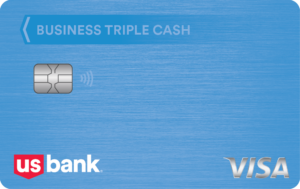 U.S. Bank Business Triple Cash Rewards World Elite Visa® | Travel, fuel, dining, office supplies, and phone service expenses | 0% on purchases for the first 12 billing cycles | Up to 5% cash back | ||
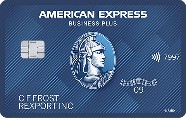 American Express Blue Business CashTM Card | Expanded buying power | 0% on purchases for the first 12 months | Up to 2% cash back | ||
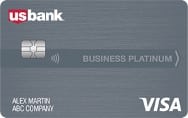 U.S. Bank Business Platinum Card | Long 0% introductory period | 0% on purchases for the first 18 billing cycles | None | ||
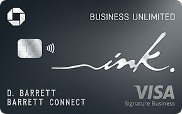 Chase Ink Business Unlimited® Card | Unlimited cash back | 0% on purchases for the first 12 months | Unlimited 1.5% cash back | ||
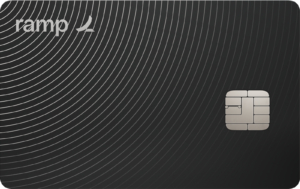 Ramp Credit Card | No personal guarantee and up to 20x higher credit limits | None | 1.5% cash back | ||
Note: All listed cards on the table require at least good credit standing to qualify. Enrollment is required for select benefits. | |||||
Tips for Business Owners Planning to Use Credit Card Stacking
While business credit card stacking can provide funding, it carries risks—like accumulating debt. To avoid these risks, consider the following tips:
- Set a budget: Plan your budget carefully to prevent overspending.
- Monitor expenses: Use a system to track transactions across cards to identify spending trends. You can use budgeting apps and expense tracking software, or create an Excel spreadsheet.
- Pay balances on time: Aim to pay off balances promptly to avoid APR charges. If necessary, at least make the minimum payment.
- Track due dates: Note each card’s due date to prevent late payments.
- Set up automatic payments: If possible, set up automatic payments for each card to ensure you don’t miss a due date.
- Use rewards to offset charges: Redeem rewards as statement credits to lower your balance.
- Separate personal and business expenses: Use business credit cards solely for business expenses to avoid accounting issues and make tax season easier.
- Maintain a low credit utilization ratio (CUR): Credit utilization ratio refers to the amount of revolving credit you’re using divided by the total credit available to you. Keep your CUR under 30% of your available credit limit.
Frequently Asked Questions (FAQs)
Credit card stacking refers to the practice of applying for multiple credit cards to access a significant total credit limit. This strategy can be particularly beneficial for small businesses looking to secure financing without needing to provide collateral.
To manage multiple credit cards effectively, consider creating a spreadsheet in Excel or using budgeting apps. These tools will help you keep track of each card’s balance, fees, and due dates.
No, you cannot combine all your credit card limits into one. However, you can use multiple cards to access a larger overall credit limit. This process is known as credit card stacking, where your cards come from different issuers, each with its own credit limit depending on the issuer’s terms. It’s important to keep track of all your credit cards, their respective credit limits, and the due dates for each card’s bill.
Spreading your debt is generally better for your credit score. This keeps your credit utilization ratio lower on any one card. Your credit utilization ratio is the amount of credit you use compared to your total available credit. A high credit utilization can negatively affect your personal and business credit scores.
Yes, paying your credit card balances twice a month can benefit you by reducing the balance reported to credit bureaus. It can also free up available credit faster, increasing your purchasing power. If you carry a balance that accrues interest, making multiple payments can lower the interest you pay rather than waiting to make a single payment each month.
No, credit card stacking is not illegal and can be a viable financing option for businesses that find it challenging to qualify for traditional loans. However, it is important to be aware of the associated risks, such as potential negative effects on your credit score, increased debt when cards are not managed well, and high interest rates if balances are not paid on time.
Bottom Line
Credit card stacking is an alternative form of business financing to fund your startup or small business through an unsecured line of credit. It is a good option if you have trouble qualifying for an SBA loan or seek cash rewards. However, if you don’t want to monitor several credit cards, consider other business loan options. Explore the best easy business loans to find a better alternative to credit card stacking.
Fit Small Business has partnered with CardRatings for our coverage of credit card products. Fit Small Business and CardRatings may receive a commission from card issuers.